UK General ELECTION 2024
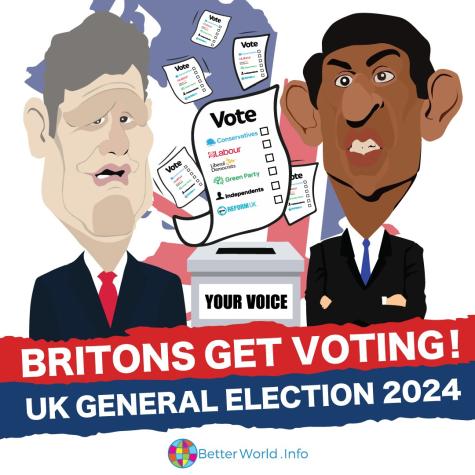
➡️️ UK General Election - 4 July 2024
Thrown into chaos after the Brexit vote in 2016, the UK has since endured a revolving door of Prime Ministers, bringing with it instability, weak economic performance, and lack of leadership.
It is safe to say that the British people are ready for change, but whether Sunak or Starmer are the ones to bring it is another debate entirely.
The countries two main parties the Conservatives and Labour have struggled with internal divisions, and controversies ranging from racism to questionable funding to complicity in Gaza war crimes.
Better World Info's guide to the ➡️ 2024 UK General Election boasts over 1,000 resources on -
-
Social media pages to follow
-
The main parties
-
and a complete guide to British politics in general
More than half of the British public are unhappy with the state of democracy and trust in the government has fallen dramatically. As such, political apathy in the UK is rife, particularly among young people.
The recent local elections revealed large gains for the Labour Party, heavy losses for the Conservatives, and gains for smaller parties such as the Liberal Democrats and Green Party. Polls have predicted a heavy win for Labour, but with the general public disillusioned with the leaders of both parties, it is unclear whether voters will show up to the ballots.
Our independent candidate guide encourages voters to explore options outside the Tory and Labour Party. Find detailed resources on Jeremy Corbyn, Andrew Feinstein, and George Galloway.
Of note, this general election is set to be the first one where voter identification is required to vote in person, it will also be the first general election since the UK's departure from the European Union.
➡️ betterworld.info/UKElection - please help us spread the word
Help us by sharing our social media posts on X, Facebook, and Instagram.
Make sure to check out our in-depth guides to all British political party's including Labour, the Conservatives, the Liberal Democrats, the Green Party, and Reform UK.
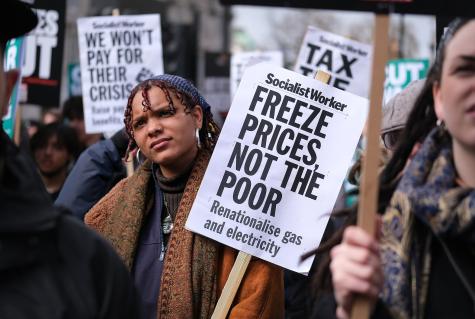
Where do Labour and the Conservatives Stand on Important Issues?
Recent polls have unveiled the top issue for 45% of UK voters is the cost-of-living crisis. Healthcare comes in second place, followed closely by the economy in general, immigration, and then the environment and climate.
-
Private rental costs continue to grow at a record high rate, 2.5 million renters are behind or consistently struggling to cover payments
-
4 in 10 people are struggling to afford energy payments
-
In 2022, UK inflation reached a 41-year high
-
One in five people are living in poverty
-
3.8 million people experienced the most extreme form of poverty in 2022, a 61% increase since 2019
This general election many voters are finding it hard to differentiate between the policies of the two main parties. Election manifestos are not currently available, but based on promises and campaigning strategies we offer an insight into their vision for the country if elected.
ECONOMY and COST-OF-LIVING CRISIS
After the disastrous mini budget from his predecessor Liz Truss, the economy has been a focal point of Sunak’s time in office. While he has managed to reduce levels of inflation, they still remain higher than the Bank of England's target. The economy has shown signs of growth, but debt has risen to 89% of GDP, up from 85% in late 2023.
Both parties have expressed reluctance to raise taxes. The Labour Party has focused on a shift in the spending of taxpayer's money, reducing government consultancy spending, and recouping billions of lost money in fraudulent covid contracts.
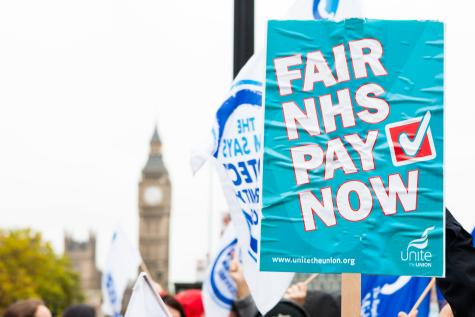
HEALTHCARE and the NHS
NHS waiting times have rocketed in the past two years. A record 7.8 million people are currently waiting for hospital treatment, a third of which will wait more than 6 months for their appointment.
Ongoing unprecedented strikes and protests swept the nation in 2022 regarding industrial disputes and low pay in the once celebrated healthcare system. Staff claim that patient safety is being compromised by inadequate staffing levels and staff burnout.
Although deals were eventually reached, Sunak's response to the strikes was heavily criticised as he held up pay deals, and blamed unions and strikers for record patient waiting times – rather than chronic underinvestment which has strangled the NHS for years.
Despite his track record, Sunak has said he will introduce record funding and staffing if elected. However, in real terms, the proposed increase amounts to no real growth in the NHS budget between 2023/24 and 2024/25.
Labour has promised to get the NHS “back on its feet” by delivering 40,000 more evening and weekend appointments a week. They stand against privatisation and have committed to keeping healthcare free for everyone but have laid out no clear plan.
IMMIGRATION
A record number of migrants crossed the channel into Britain in the first three months of 2024.
The Conservative government promises a firm stance on immigration, which has proved popular with older generations. They have pledged to “stop the boats” and bring in deterrent measures for immigrants and asylum seekers considering heading to the UK.
The proposal includes a planned cap on the number of people able to claim asylum, a raise in minimum salary for skilled workers, and visa cuts for several sectors. Sunak's government is facing widespread criticism over their Rwanda deportation bill, which could prove to be an important factor for voters.
Similarly, Labour aims to reduce the UK’s reliance on overseas’ workers by improving conditions and pay for the British workforce. They are also hoping to switch to a points-based immigration system, which grants visas based on factors such as education, skills, and languages, and have mentioned the introduction of a Border Security Command to aid in the control of UK borders.
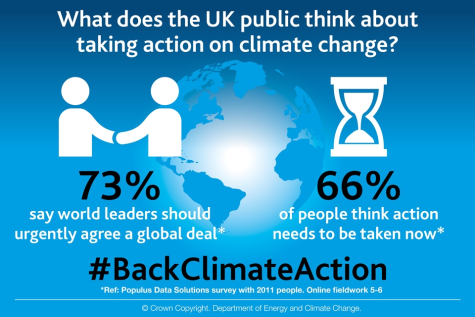
ENVIRONMENT and CLIMATE
The UK so far has not emerged as a leader in climate policy and neither party boasts impressive environmental or climate strategies. The current Conservative government came under fire recently as it emerged that water companies have knowingly been dumping raw sewage into rivers and seas. Failure to stem the problem has seen discharges double from 1.8 million hours in 2022 to a record 3.6 million in 2023.
Conservative policies on the transition to electric vehicles and to heat pumps were both pushed back, and in a total net zero U-turn, Sunak in 2023 greenlit the exploitation of the UK’s largest untapped oil field. The Rosebank Oil Field project which has the potential to deliver 500 million barrels of oil was met with widespread objection by the British public.
The Labour Party has proposed a transition to a publicly owned sustainable energy company “Great British Energy.” The plan would be paid for by the windfall taxes of gas and oil companies and promises to lower household energy bills. Despite this, Labour recently announced that it would be cutting its £28bn green energy pledge in half. Starmer blamed high interest rates and rising government debt for the party's inability to fully fund the green investment plan.
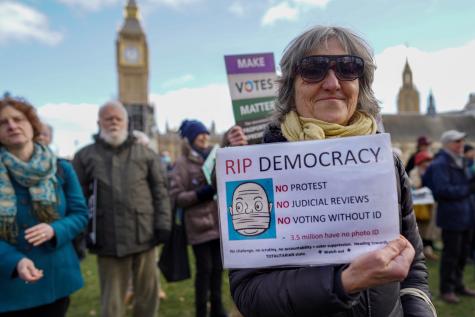
New Voter ID Law – What You Need to Know
Many prodemocracy organisations maintain that the changes brought in by the 2022 Elections Act were unnecessary and damaging. The act means that photo identification is now compulsory for in-person voting.
In the 2023 local elections at least 14,000 people were turned away at the polls due to lack of acceptable ID. The true figure of those affected is most likely much higher as it does not include those who stayed at home for lack of photo identification.
It is estimated that 2 million people do not possess any form of acceptable ID. Discriminatory by design, voter ID laws particularly affect marginalised communities as they are much less likely to have the required identification.
Political apathy in the UK is huge. Voter turnout averages between 60-70% of the population and acts such as this are further deterrents to promoting political engagement.
For those who do not have suitable identification they can apply for a free Voter Authority Certificate, but the application must be submitted by June 26 to be eligible for this year's election. You must also ensure that you are on the electoral register and therefore registered to vote.
Acceptable forms of Photo ID include -
-
Driver's license (UK, Northern Ireland, or EU)
-
UK Passport (Issued in the UK or in the EU)
-
PASS card, Blue Badge, Defence Identity Card
-
Biometric Residence Permit
-
EU or Northern Ireland Identity Card
-
Anonymous Elector’s Document
-
Travel passes including an older person’s or disabled bus pass, Oyster 60+ card, Scottish National Entitlement Card, Welsh Concessionary Travel Card, and Northern Ireland Concessionary Travel Pass
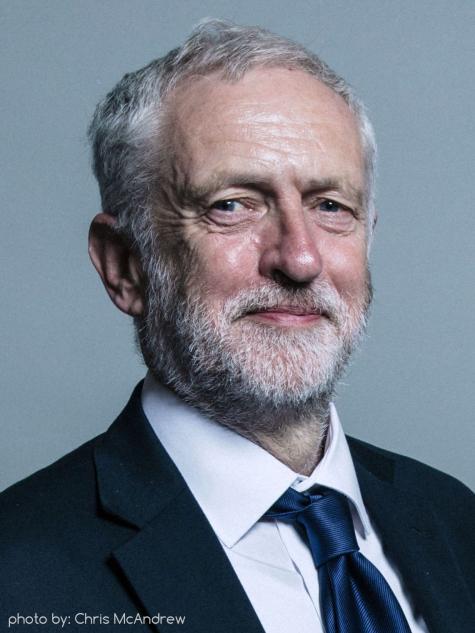
Reasons to Vote for an Independent Candidate
Independents are not forced to follow party ideology, muzzled by party whips, or influenced by powerful lobbies. They can work across party lines, blend ideas from across the political spectrum, and help to build consensus and forge effective policies.
Independents run grass-roots campaigns, stand for the people of their constituency and are the mouthpiece of that community.
They do not have the luxury of widespread public awareness, a longstanding political history, and substantial financial backing from corporate interests and wealthy donors. There is also a lack of support by the mainstream media who play into the hands of the Conservative and Labour parties, and censor independent candidates.
Independents must battle against party establishments, but can think and act without constraints. They are driven by passion and have the interests of local people at their heart. Their allegiance is only to their voters, and as such have greater accountability.
A vote for an independent candidate helps us move away from two-party dominance and introduces healthy competition into elections. Voting for independents is a vote for a fairer electoral system, a good way to standup to corruption and lobbying efforts and offers a refreshing change from the status-quo.
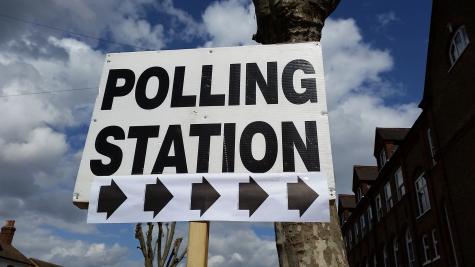
Vote, Vote, Vote!
As campaign promises offered by the Conservative and Labour Party seem to be one and the same, it is more important than ever that we use our vote wisely.
We can educate ourselves on the merits of outsider parties and independent candidates, or we can vote with the intent of preventing a particular party from winning by using tactical voting.
Voting gives us the power to decide the future of the UK. By showing support for a candidate, whether they win or not, shows support for their policies. It helps politicians to understand the issues that we, the general public, really care about and the issues they should focus on to gain more support next time.
The turnout divide between age groups and social-economic status is growing wider. Statistics show that millennials, non-graduates, and non-homeowners are increasingly less likely to vote when compared with older generations, those with degrees, and homeowners. Fair representation of all demographics is needed to promote greater social equality.
After 14 years of Tory rule, the Labour party is predicted to win by its biggest majority in 100 years. But many feel a better option would be a smaller party or independent candidate.
Arguably Labour represents the lesser of the two evils, but many Brits are critical of both. Starmer has become infamous for his long list of U-turns and abandoned pledges including tuition fees, benefits, tax hikes for the rich, nationalisation of public services, post-Brexit freedom of movement, and his Green Prosperity Plan.
He has purged the party of many left-wing and progressive candidates, and his broken promises amount to him delivering the opposite of what he said he would at the beginning of his Labour leadership in 2020.
One thing for sure is that the new government will have an uphill battle ahead of them.
Have your say! - Make sure you are registered, bring your ID, and get down to your polling station this July 4th.
Author: Rachael Mellor, 12.06.24 licensed under CC BY-ND 4.0 updated 27.06.24
For further reading on the UK General Election 2024 see below ⬇️